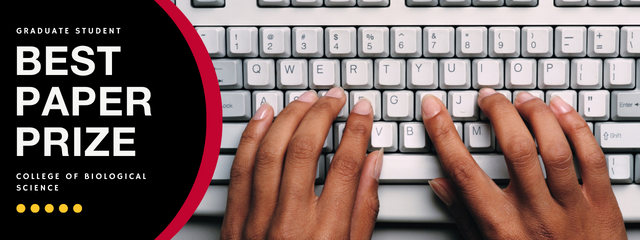Three students recognized with CBS Graduate Student Best Paper Prize

The College of Biological Science is recognizing three graduate students who published exceptional peer-reviewed articles in 2022 with the CBS Graduate Student Best Paper Prize. The competition, now in its fourth year, awards one graduate student from each department with a $500 prize.
This year’s winners include Avery Hinks from Human Health and Nutritional Sciences, Dr. Steven Kelly from Molecular and Cellular Biology, and Sophia Stoltz from Integrative Biology.
“These three papers showcase the breadth and excellence of research being undertaken by graduate students within CBS,” says Dr. Graham Holloway, associate dean of research and graduate studies. “We are incredibly proud of the work of our graduate trainees and wish them continued success in their diverse fields of study.”
Avery Hinks, Human Health and Nutritional Sciences
Avery Hinks, now a PhD student in the Neuromechanical Performance Research Lab, wrote “Influence of weighted downhill running training on serial sarcomere number and work loop performance in the rat soleus” when he was a master’s student. Hinks led the research and is the first author on the article, which was published in July 2022 in the journal Biology Open.
Hinks’ research focuses on how muscles adapt to use, specifically how sarcomeres are added in series during muscle lengthening exercises. Using rats fitted with weighted vests running downhill, he found that these muscle lengthening exercises could reduce passive muscle tension. This tension is experienced by individuals with cerebral palsy, stroke patients and elderly patients with muscle loss, among other populations. For his work on this topic, Hinks was awarded the Canadian Society for Biomechanics New Investigator Award at the North American Congress for Biomechanics.
“Avery’s work epitomizes the ethos of a student-led Best Paper Award,” says Hinks’ advisor, Dr. Geoffrey Power. “He independently led this project from the planning stages to acceptance in an academic journal without major rewriting/input from me. Working with Avery akin to working with a close collaborator.”
Dr. Steven Kelly, Molecular and Cellular Biology
Dr. Steven Kelly, a recent alumnus, wrote the paper “The biosynthetic origin of ribofuranose in bacterial polysaccharides” while completing his PhD under the supervision of Dr. Chris Whitfield. The article was published in the journal Nature Chemical Biology in April 2022.
Kelly played a pivotal role in conceiving and executing the project, including coordinating multidisciplinary activities with two collaborating groups in Guelph and another in Taiwan. His study identified contradictions in the literature around the origins of the sugar ribofuranose in complex carbohydrates, hypothesized and validated an alternative donor and mechanism of incorporation, and provided the first structure of a prototype enzyme. The research, which was highlighted in Faculty Opinions, has substantial implications in the fields of microbial glycobiology and biochemistry and potential applications in vaccine development.
“The paper offers a comprehensive view of a novel enzymatic pathway present in many microbial systems – different organisms, making different types of polysaccharides, with diverse biological functions,” says Whitfield. “As a result, it has broad biological significance. It sorts out longstanding contradictions in the foundational biochemistry literature and identifies future research avenues for the field.”
Sophia Stoltz, Integrative Biology
Sophia Stoltz, a PhD student in Dr. Brian Husband’s Plant Population and Evolution Research Lab, wrote “High genetic diversity in American chestnut (Castanea dentata) despite a century of decline.” She led all aspects of the research and was the first author on the paper, which was published in the journal Conservation Genetics in November 2022.
The research describes the patterns of genetic diversity in the remnant populations of American chestnut in both Canada and the United States. Once a dominant member of eastern deciduous forests, the tree’s population has been decimated in the past century due to chestnut blight. Stoltz’ paper is the first population genetics study spanning the full latitudinal range of the species. It also provides the first estimate of the incidence of hybrid American-Asian chestnuts and explores the relationship between hybridity and tree health.
“Sophia’s study highlights the challenge of restoring tree species with low resistance to pathogens. It represents the first step toward evaluating the potential of restoring such species by either promoting natural evolution of resistance or supplementing populations with genetically resistant sources developed from breeding programs,” says Husband.